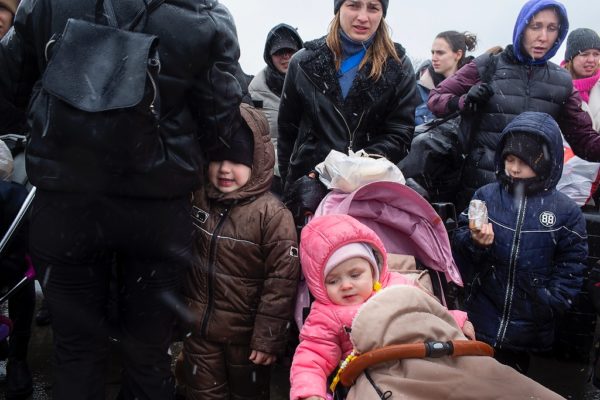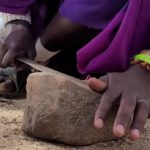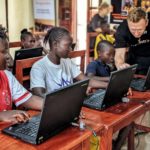In these days of great sadness for what is happening in Ukraine, hope shines through the strength of empathy and solidarity, which crosses borders and reaches right into the heart of war. Romania, where I currently live, is the main gateway for refugees from Ukraine to Europe, as is Poland. From this observation point I went in search of touches of humanity and found many. I am convinced that as expats we have a duty to recount what is happening in the countries where we live. Interpreting reality from a new perspective can be very helpful.
For those born and raised in Western Europe in the second half of the twentieth century, war has always felt distant. Distant in time, fought between the pages of history books or in the stories of grandparents, or distant in space, even if, in fact, it was not. Just think of the example of Yugoslavia. But we liked to think about war this way: unfair, cruel, terrible, but “belonging to others”.
Perhaps it was a kind of defence mechanism, a way of not being overwhelmed by horror. Maybe we should be a little indulgent to ourselves for every time we were not emotionally involved in other wars. Now I realize how superficial we were, and how bitter the awakening is today.
During my years in Bucharest, I often heard sirens, but was only afraid the first time. I often saw fighter planes pass over my house, but they didn’t worry me: Oh yes, there are NATO bases, I said to myself.
Today, however, war is close and is invisibly but tenaciously creeping into everyone’s daily lives. In recent days Italy has sent more planes the Mihail Kogalniceanu military base, near Constanța. Yet Constanța always evoked sea rather than war for Romanians, and for me, until a week ago.
A friend sends me a message: you can donate blood for wounded Ukrainians at the blood transfusion center at the Central Military Emergency University Hospital. I am overcome by anxiety and hearing my children in the next room going on with their life does not make me feel better. I need to go out. Passing near the Ukrainian Embassy is painful: flowers, candles, signs in many languages. A group of a dozen people are out there, maybe waiting to enter, maybe waiting for news. I dare not ask; I dare not get close to those harrowed eyes.
I need to find some humanity in these cold days, to get, if not relief, at least a moment of respite in my thoughts. I want to listen and talk about the solidarity that runs along those 600 kilometers of border with Ukraine, and that from there engulfs the whole of Romania. After all, Halso made up of the many gestures of ordinary people and organizations, and this, too, must be told.
My friend Alexandra Paucescu shows me the photos of the Caradja Cantacuzino Association, one of the many organisations receiving aid in Bucharest: the number of volunteers and the amount of essential goods is impressive. Meanwhile, within a few hours, the entrepreneur Alexandru Panait created the refugees.ro platform, to connect Ukrainian refugees, who can specify their needs, with those who want to help them with housing, lifts, meals, and basic needs. And the number of those who help out continues to grow, as well as the list of restaurants and hotels that offer meals and accommodation to Ukrainian passport holders.

Refugees form Ukraine arriving at Isaccea (Romania). Photo © Mugur Varzariu
As I scroll through the endless offers of help online, with hundreds of Romanians opening the doors of their homes, welcoming people to their table, or giving lifts, I get a message from Simona Carobene, an Italian social worker in Romania, who has travelled to the border with Ukraine.
She tells me about the cold, the snow and the many, many people who arrive having covered miles on foot. On her journey, she was left speechless when she received a call from a desperate woman in tears who asked for bulletproof jackets, helmets, gloves and boots for the soldiers.
Roman, a Ukrainian who managed to enter Romania with his wife and five children, could have moved on elsewhere. He has a network of contacts in other European countries, but he decided to stay there, at the border: he speaks English and Romanian; he can help his people. He lives in a shelter with 57 others, many of them children. And he knows that what they need is not only blankets or food, but also not to feel alone. They need a smile, a hug. ‘What hope do you have for your country, for your people?’ asks Simona. Roman shrugs: ‘Eternal life, perhaps’.
Right after this I get a call from Don Valeriano, a priest friend. He’s 50 kilometres from Budapest, on his way back from Italy. Two nights ago, he received a phone call from Lviv: You have to rescue disabled people, it is difficult to keep them in the improvised bunker in the building where they live. Valeriano and a colleague take a car and a bus and leave.
They arrive in the middle of the night at a secondary custom, hoping it will be easier for them to pass. And so it is: only three hours of waiting and a dozen people, including two in wheelchairs, cross into Romania. They drive through Italy. . As I write, Valeriano is making another journey, this time to rescue 44 people, mothers and children. Not all minors have documents, but he is confident that also this time there won’t be any problem.
Meanwhile, at the border, Romanians do what they can, bringing food, blankets, toys, offering car rides, a bed, a meal in their own home.
I scroll through the photos of a photographer friend, Mugur Varzariu. As I thought, he is there, at the border, too. I ask him to tell me about a moment, a face, a situation that struck him, that helped him to keep hope and trust in humanity alive.
He tells me about Anastasiia, who arrived with her mother and her child from Odessa at the border checkpoint of Isaccea, carrying a trolley and nothing else. Exhausted, she burst into tears when she realized she didn’t have her biometric passport with her. The frontier commander, a big man in a dark uniform, offered her a rose, which had somehow ended up there in the confusion, and then he let her through. From Isaccea, Anastasiia found a lift to Bucharest, where she is now hosted by the mother of a Romanian gendarme. .
Faced with so much violence, so much pain, when despair seems to overwhelm us, we must take a moment to think about the example of so many people, women and men, who in the cold of the long night our continent is going through, open the doors of their homes and keep burning a flame of hope, as small as it is precious.
This article was adapted from the original published in Italian on March 4, 2022 in the online magazine Mentinfuga.
All pictures ©Mugur Varzariu
Giuliana Arena
Bucharest, Romania
March 2022
 Previous Post
Previous Post Next Post
Next Post